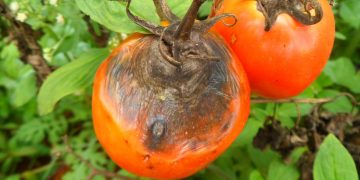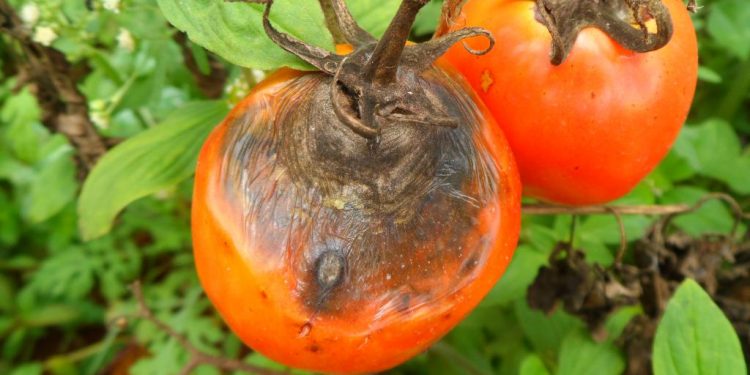Tomato (Lycopersicum lycopersicum) is one of the most economically important food crops worldwide.
Early blight, caused by Alternaria solani, is a particularly destructive disease of tomato and other solanaceous crops, affecting all above-ground plant parts. Rotation with non-host crops and removal of weeds are not completely effective control measures because the fungus is dispersed between tomato fields via air-borne spores and can survive in plant debris for long periods of time.
Fungicides can be applied to manage the disease, but the regular use of chemicals is associated with high costs, health and environmental hazards, and the risk of pathogen populations developing fungicide resistance. Host resistance would be the management strategy of choice, but because of the lack of single-gene resistance and the complex quantitative nature of inheritance of early blight resistance, there are no commercial tomato varieties available that have sufficient levels of resistance against A. solani. Biological control using microbial agents is an environmentally friendly disease alternative management approach that is also compatible with host resistance and cultural control measures. Rhizobacteria, i.e. bacteria that inhabit the rhizosphere, are considered potential candidates as biological control agents. Biological control agents can suppress disease development indirectly by activating plant defenses prior to pathogen infection (often referred to as Systemic Acquired Resistance (SAR) or by enhancing the expression of plant defenses on infection, a phenomenon called priming. Because individual rhizobacteria strains have the potential to colonize plants and express multiple biological control mechanisms, this microorganism group has been explored around the world as a source of biological agents to control early blight disease in tomato.
In field trials in Pakistan, Rhizosphere bacterial strains of B. amyloliquefaciens S27, B. cereus Dt10 and S. rhizophila 423 have been found to have potential as biocontrol agents against early blight disease of tomato. Among these three strains, B. amyloliquefaciens S27 appears to be the most effective and consistent in field trials under conditions in Pakistan. Control of early blight using strain S27 requires repeated field applications, and thus more research is required to improve its biological control efficacy. The information on possible mechanisms of action by S27 revealed in this study offers opportunities.
Photo: EPPO (2024) EPPO Global Database. https://gd.eppo.int
Reference: Riaz, H.M., Chohan, S., Yuen, G.Y. and Abid, M. (2024). Biological control of tomato early blight in Pakistan using local rhizobacteria. Pest Manag Sci, 80: 1412-1422. https://doi.org/10.1002/ps.7872































